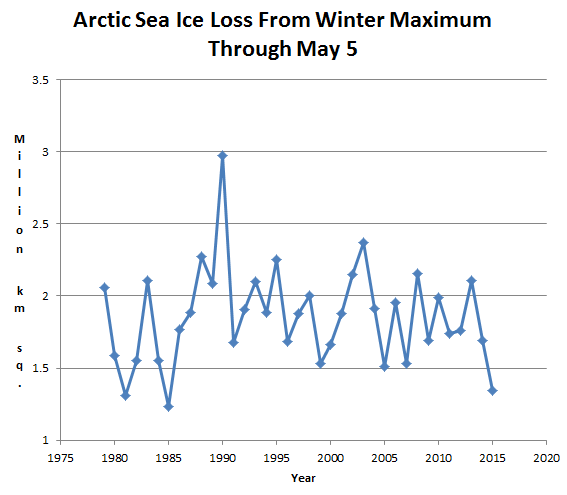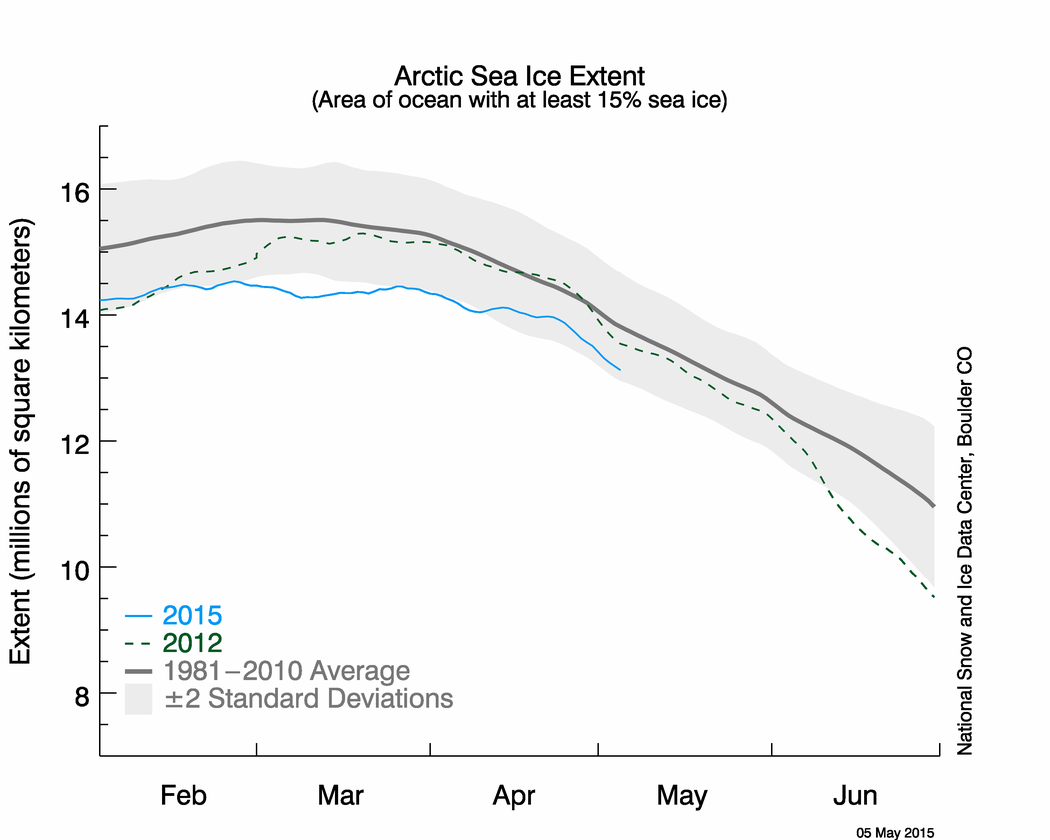As is normally the case, what the Guardian says is the exact opposite of reality
There was less ice in the Arctic this winter than in any other winter during the satellite era, National Oceanic and Atmospheric Administration scientists said on Tuesday.
The announcement was consistent with previous predictions that the Arctic would have entirely ice-free summers by 2040, they said in a briefing to the media on the state of climate trends in the north pole.
After undergoing a period of colder temperatures and slower ice retreat between 2007 and 2012, the Arctic is returning to a warm period with the overall trend over the decades continuing to show temperatures getting hotter and ice melting faster.
This year, full ice coverage – the point at which the ice reaches its peak and then starts melting – was reached on 25 February, more than two weeks before the expected date of mid-March, said Jeff Key at NOAA’s Satellite and Information Service’s center for satellite applications and research. This means ice started to melt earlier and faster than in previous years.
Arctic ice melting faster and earlier as scientists demand action | Environment | The Guardian
In fact, ice melt this spring has been the slowest in 30 years
And the ice didn’t really start melting until the end of April, much later than normal. Ice extent is in the normal range.
Whatever the Guardian says, assume the exact opposite to be true.




It would seem they are competing for the “Criminal of the Century” award, but will have a tough row to hoe when competing with NOAA/NASA 😉
http://notrickszone.com/#sthash.7ESz97L1.dpbs
My prediction is that the Guardian will suffer a total meltdown well before the Arctic does. This year’s average circulation is 185,429. That’s less than half of the corresponding figure for 2008. Meanwhile, its fellow alarmist UK paper, the Independent, is now selling just 61,338 copies per issue, less than a quarter of its 2008 circulation. Its demise is now certain to occur well before the end of winter snow.
You make a good point Tim ; Selling Fiction masquerading as News has its downsides.
Tim, if the Gaurdian’s circulation is only 185,429 that is probably the number of brain-dead hard core leftists left in the UK.
And how many of those in the BBC & Ch4?
Sadly the demise of print is due more to the upward thrust of the popularity of the internet and online newspapers than a lack of quality in the content .
Keep hoping it is down to a lack of quality, but it isn’t
Quote (from the The Guardian itself !)
“citing the Guardian, Telegraph and Independent particularly for producing the highest ratios of monthly unique visitors to their sites when compared against print circulations. (The Guardian, with a 125 unique-visitor-to-print ratio, is far higher than any other European paper he can find, and also generates over three times the number of UK page impressions relative to its circulation). Moreover, UK national papers as a whole score well on such tests, clear top of the EU league and walloping German performance nine times over.”
The Guardian is doing very well as far as internet visits go.
OECD report into the decline of the printed newspaper
http://www.oecd.org/sti/oecdexaminesthefutureofnewsandtheinternet.htm
But, none of that matters…….they could become the most popular online paper and still not carry any truth about CAGW if they do their PR right…..it is easy for people to believe that CO2 causes global warming because to do so “can’t harm anyone, can it ? ”
We are passive by nature with things that we don’t fully understand, and strangely sometimes risk averse – we all knew that seatbelts in cars saved lives, and pressure by the governments of the world to force car manufacturers to install seatbelts for our protection was seen as a huge success for health and safety of the public
Except, the problem was very few people wore them, and it then took a law to make seatbelt wearing compulsory before the majority benefited from wearing them, like they knew they should ! – the customer isn’t always right 😉
When you fit that mentality onto the CO2/global warming disaster mindset the results are completely unpredictable….how many people are happy that it won’t happen in their lifetime anyway ?
Forgot to mention that it’s interesting to note that the Guardian is very good at adapting it’s news to suit the broadest number of clients…….the perfect example of this is that we are discussing it……we click on the link and go and visit the site…clicks is all that matters (more or less) to the internet………length of stay is important too, but ultimately if they can write a story which they know will madden CAGW ‘conspiracy theorists’ they’ll not only write it but give it a hyperbolic headline too if it increases the number of visitors, even when the visitors are reading the story in order to find holes in it.
And then some of the said visitors will do the best thing for the Guardian – they will go onto the forums of the Guardian and start discussing the topic….in so doing increasing the stats relevant to the length of stay of individual visitors…..and all of that means they can charge more to people wanting to place an advertisement…..it is only business after all.
Spot on, Chris. To stay in business, a “free” web medium needs either a very generous sponsor or else it needs to sell its audience to its advertisers, and it will try to do this by touting (a) the user stats such as UUs, PVs and average sojourn times, and (b) the “quality” of its users/visitors, including their tastes, income level, and spending habits, which can be estimated from the results of online questionnaires. The upshot of this is that every time we visit the Guardian and read or comment on its articles, we are indirectly helping to support its continued existence by making its numbers that little bit more attractive to advertisers.
Another one joins the show
http://www.powerlineblog.com/archives/2015/05/noaa-caught-rewriting-us-temperature-history-again.php
Hopefully the internet gets flooded with these reports
Glad you keep highlighting the Guardians repeated propaganda. They recently had a piece on the Antarctic with a suitably screaming headline about the ‘melting’ Antarctic and ’15 meter’ sea level rises….yet any claimed changes would take (literally) many hundreds of years. Obviously any comment pointing that out was deleted. Absolute tossers.
If anyone can stomach it, here it is:
‘Melting Antarctic: Failure to act now on emissions could raise oceans by metres’
http://www.theguardian.com/environment/planet-oz/2015/may/05/melting-antarctic-failure-to-cut-emissions-now-could-raise-worlds-oceans-by-several-metres
Their fellow travellers at the ABC,
“Biologist Hans Ulrich-Peter told us that Adelies (penguins) were heading south in search of their main food source, krill.
Krill feed on phytoplankton under sea ice, but the ice is either forming late or not at all.” http://www.abc.net.au/news/2015-05-05/scientists-in-antarctica-investigate-effect-of-climate-change/6430000
Problem current sea ice extent:
http://nsidc.org/data/seaice_index/images/daily_images/S_daily_extent_hires.png
https://sunshinehours.files.wordpress.com/2015/05/antarctic_sea_ice_extent_zoomed_2015_day_125_1981-2010.png
http://nsidc.org/data/seaice_index/
“The first global census of the Adélie penguin, long considered a key indicator species to monitor and understand the effects of climate change and fishing in the Southern Ocean, has revealed its population (3.79 million breeding pairs) to be 53 percent larger than previously estimated.”
http://www.sciencedaily.com/releases/2014/07/140709095303.htm
“The [West] coast of Antarctica is like a ring of fire,”
http://www.livescience.com/41262-west-antarctica-new-volcano-discovered.html
“Whatever the Guardian says, assume the exact opposite to be true.”
The UK editor in chief is Rhodesian born, privateley educated English Lit student, soon to be replaced by Kath Viner who was raised in Yorkshire so I held out a bit more hope, until I read she was also an English Lit student and playwright, and is EiC of the US Guardian…..
You can expect the Guardian to be extremely well written, full of lovely prose, and my knowledge of English lit students goes as far as to know that they prefer to improve the quality of the writing rather than the quality of the content.